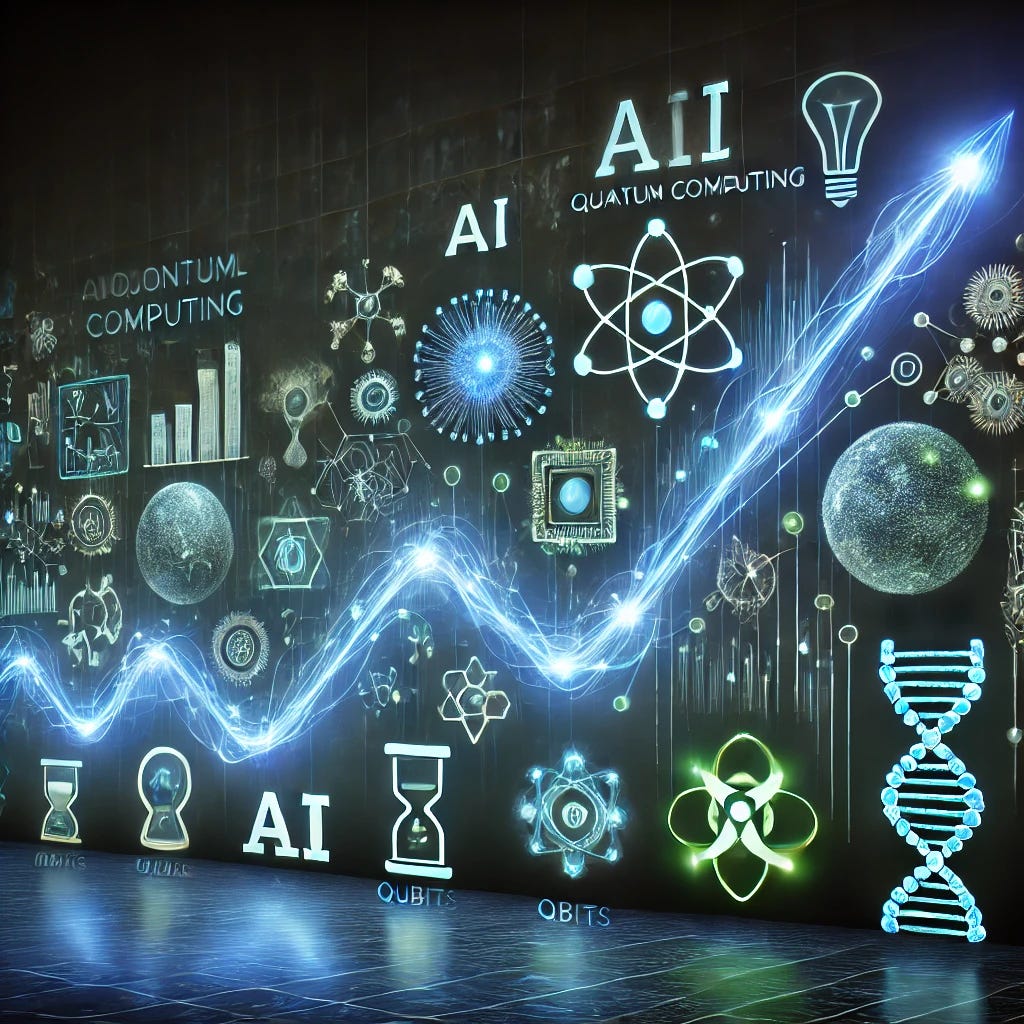What I Learned: AI Is Accelerating Quantum Computing Research
The virtuous cycle of technological breakthroughs.
Hi everyone,
I hope you're all having a great weekend. I wanted to write about a few things that came across my plate this week. But, most interesting was an article on TechCrunch, discussing how a quantum computing research lab and Nvidia are using AI to greatly improve the performance of quantum computers.
Quantum Machines & Nvidia
Introduction to Quantum Computing
Before getting into this article, I'm just going to share a brief explanation on how quantum computers work, which I had to research to fully understand the article.
As you may or may not know, regular computer chips run off a series of switches which can be either on or off, 1 or 0, respectively. Then, based on a series of 1's and 0's the computer translates them into output, either in the form of calculations, text on a screen etc. The key point being, each switch can only ever be either on or off at any given time.
With quantum computers though, those switches are called qubits, and they can actually be both on and off at the same time. Yes - things don't make sense when it comes to quantum physics. Nonetheless, this quality of being in different states at the same time allows quantum computers to perform complex calculations way faster than a normal computer.
For reference on what "way faster" means, a lot of security systems across the internet today depend on encryption, which is basically mathematical problems that would take a super computer millions of years to solve, unless they have the right "key" to solving the problem.
A quantum computer, however, would be able to solve these problems, and break the encryption in a matter of minutes. Millions of years down to minutes, that's a big step-up in compute power.
(For clarity, some forms of encryption are considered quantum resistant, but many aren't.)
The Development
So aside from the often discussed dangers of quantum computing, like encryption, there are obviously a lot of benefits that could come from that kind of computing power too. Training AI models for example, is extremely compute intensive, hence the massive capital expenditure happening right now in the field.
One of the big problems with quantum computing though, is that when qubits are both "on" and "off" at the same time, they're also super unstable. Even tiny changes in temperature, or noise can cause them to fail and revert back to the normal state of being either "on" or "off".
Yet, by working with Nvidia, the team at Quantum Machines was able to use an off-the-shelf AI algorithm to essentially monitor the state of the qubits in real time, adjusting as needed to help them maintain their ideal state.
Oddly, and frustratingly, the article doesn't share how much of an improvement was achieved. Only that the improvement was meaningful, and that even tiny improvements in this problem produce exponentially better performance. And, being an off-the-shelf algorithm, there is implicitly a lot of room for said improvement through customization.
Why It Matters
What I find so exciting about this is the growing intersection between AI and scientific research. Just a few weeks ago Demis Hassabis and John Jumper of Google Deepmind won the Nobel prize in chemistry for their work on AlphaFold2 - an AI model which revolutionized our understanding of protein structures by successfully predicting the shape of nearly every known protein in existence.
Now, with this article, we are seeing the first hints of AI helping to improve the performance of quantum computers. There is a beautiful virtuous cycle occurring where each breakthrough technology spurs progress in another breakthrough technology, which compound into the next.
This has obviously been happening for the entirety of human existence. Agriculture allowed people enough time to discover metallurgy, and so on down the tree of technological progress.
Now though, it feels that the pace of innovation and breakthroughs are speeding up. Technologies are pushing each other forward faster and faster. AI helps quantum computing, quantum computing supercharges AI, AI helps us answer unsolved questions in chemistry, biology and physics, and the cycle keeps accelerating. If we're really on this exponential curve, the future is going to be wild in ways that are difficult to imagine. Despite the darkness in the world, stories like this remind me that massive opportunities are coming - we just need to watch closely enough to spot them early, whether that's in investments, careers, or just understanding where the world is heading.

